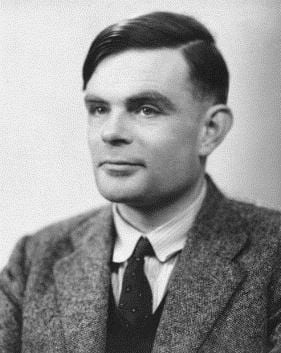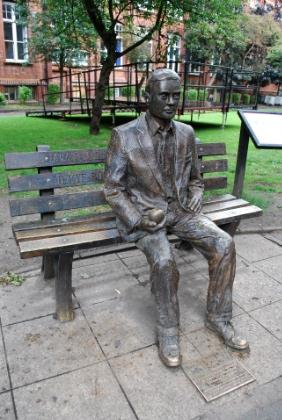
Alan Turing portrait, taken by the Elliott & Fry Studio on March 29, 1951, upon his election as a Fellow of the Royal Society. Credit: National Portrait Gallery, London, England
On a bench in Manchester’s Sackville Park — a stone’s throw from the city’s gay village — sits a statue of a bemused-looking man, cast in bronze. His gaze is fixed on the one large bite that has been taken from an apple he holds in his hand.
It is a memorial to Alan Turing, pioneering British mathematician, code-breaking genius of the Second World War, grandfather of computer science, persecuted homosexual and much-belated national hero.
This slightly macabre monument is a testament not only to the importance of Turing’s legacy, but also to the absurd aspects of the world he inhabited.
Turing was born June 23, 1912, in Maida Vale in West London. During the Second World War, Turing worked on Ultra, the code name of a project responsible for decoding Nazi transmissions. The project’s name reflected its unique “ultra top secret” classification.
During the war, the Nazis made use of an encryption system they called Enigma. A primitive version of it had been cracked by Polish code-breakers at the close of the First World War. However, Nazi intelligence continued to adapt and strengthen Enigma before and during the Second World War. Turing was the driving force behind the Allies’ efforts to keep up with the ongoing decryption of the Nazi code.
When Enigma was finally cracked, Allied forces won a crucial tactical advantage in their efforts to break Hitler’s naval supremacy. The ability to decode Nazi transmissions allowed Allied naval forces to predict the feared U-boat attacks, which had previously provided the Nazis with a potent military edge.
Following the war, Turing served as a consultant to the Government Communications Headquarters (GCH) and continued to aid British intelligence in the early days of the Cold War. In 1952, while working with GCH, Turing’s home was burgled by a man he had picked up at a cinema. After Turing reported the crime to the local police, his homosexual double life was exposed.
Turing was convicted of gross indecency under Section 11 of Britain’s notorious Criminal Law Amendment Act 1885 — the same law that led to the incarceration of Oscar Wilde.
Turing’s arrest was complicated by the atmosphere of intense suspicion that permeated Cold War Britain. Double agents were thought to be lurking around every corner, and the smear of “homosexual” was a handy fill-in for “communist.”
Due to this intense paranoia, fuelled by the fanatical homophobia that had become de rigueur in both Britain and America during the Cold War, Turing’s arrest ruined his career in intelligence. It is impossible to guess how the development of the computer and the field of computer science would have progressed had Turing been able to continue his research.
To avoid a jail sentence, Turing agreed to undergo chemical castration. The estrogen injections he was subjected to were meant to curb his sexual desires. The under-researched practice resulted in numerous side effects. At one point, Turing sprouted breasts.
In his book Strangers: Homosexual Love in the Nineteenth Century, Graham Robb exposes the fatuous nature of such medical “cures” for homosexuality: “The cure did not remove the complaint,” says Robb. “It endowed the patient with the abnormality from which he was supposed to be suffering.”
Two years after his arrest, with his life and career destroyed by government bigotry, Turing was found dead in his apartment, having ingested a lethal dose of cyanide. On his nightstand was an apple with one bite taken from it.
Although the apple was never conclusively tested, legend has it that Turing took a page from the Brothers Grimm, ending his life by injecting the fruit with the deadly poison before taking one fatal bite.
Following Turing’s death, a colleague of the mathematician mournfully surmised, “All we can do is imagine what it must have been like for a man as sensitive as Turing to be threatened . . . with the loss of everything that mattered to him, his science, his livelihood, the esteem of friends. And we must muse on the savage price exacted by a society that without him might not have survived to demand it.”
Before the scandal that led to his suicide, Turing’s heroic turn as a code-breaker during the Second World War was heralded by Prime Minister Winston Churchill. So impressed was Churchill by the work of Turing and his colleagues that he went so far as to remark to the king that Ultra had won the Allies the war.
It would take another eight decades before Turing would again win the respect of a British prime minister, after Gordon Brown issued a formal apology on behalf of the British government in 2009.
And so, since June 23, 2001 — on what would have been his 89th birthday — the bronze Turing has sat on a bench in Sackville Park, apple in hand, a bemused look perpetually etched onto his face, seemingly contemplating his fate, and perhaps too, the fate of queers everywhere.

 Why you can trust Xtra
Why you can trust Xtra


